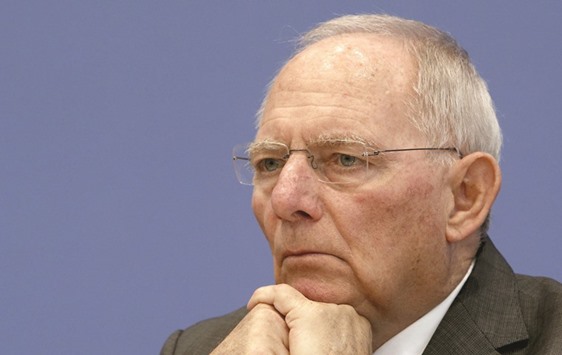The European Central Bank’s record low interest rates are causing “extraordinary problems” for German banks and pensioners and risk undermining voters’ support for European integration, Finance Minister Wolfgang Schaeuble told Reuters.
But the veteran minister said it would be wrong to blame the ECB entirely for this situation, stressing that central banks alone should not be relied on to restore economic growth and calling instead for Europe to press on with structural reforms.
Politicians from Chancellor Angela Merkel conservative camp, to which the finance minister belongs, have complained the ECB’s ultra-low rates are creating a “gaping hole” in savers’ finances and pensioners’ retirement plans as returns have dropped.
Schaeuble suggested they risked fuelling the rise of euro scepticism in Germany, where voters flocked to the right-wing Alternative for Germany in state elections last month.
“It is undisputable that the policy of low interest rates is causing extraordinary problems for the banks and the whole financial sector in Germany,” said the 73-year-old. “That also applies for retirement provisions.”
“That is why I always point out that this does not necessarily strengthen citizens’ readiness to trust in European integration,” he added in an interview.
A storm of protest erupted in thrifty Germany after ECB President Mario Draghi last month described the idea of so-called helicopter money – sending money directly to citizens – as a “very interesting”, if unexamined, concept.
Schaeuble, who said he stays in close contact with Draghi, said he would be amazed if the central bank was seriously considering such a policy.
“I don’t have the impression that serious discussions are taking place within the ECB on this,” he said.
He said it would be wrong to blame the ECB entirely for growing euro scepticism in Germany, repeating his reform mantra: “Policies in Europe must create conditions through structural reforms to better solve problems.”
Such structural reforms include measures such as making labour markets more flexible and reducing public-sector bureaucracy.
Turning to Greece, Schaeuble said he saw no need for debt restructuring.
“The agreements of last summer are clear: if the first programme review is completed successfully and then the need still arises to do something about debt sustainability, then we will talk about it,” he said. “So far, I cannot discern from the debt-sustainability analysis a need for debt restructuring.” “I currently see no need for that,” he added. International Monetary Fund chief Christine Lagarde denied this month that her organisation would push Greece closer to default as a negotiating tactic following reports of a leaked transcript suggesting the IMF may threaten to leave the bailout to force European lenders to offer more debt relief. “The IMF’s participation in the programme is agreed,” Schaeuble said. “We definitely won’t let ourselves be blackmailed. We stand by the agreements but others must too.”
Greece and its international lenders adjourned bailout review talks on Tuesday, potentially delaying a crucial cash handout to the debt-stricken nation, and will resume them immediately after this week’s IMF spring meetings.
Schaeuble said a review of Athens’ compliance with the bailout would be discussed on the sidelines of meetings of the IMF and Group of 20 leading economies in Washington this week and that an agreement seemed possible by the end of April.
“I am quite sure that we will reach an amicable settlement. We will not again be confronted with a Greece crisis this year,” he said.
“Nobody is demanding that Greece has to implement everything to the exact letter,” he said, but added: “The overall result must add up and the agreed requirements correspond to those agreed last summer.”
“It is important that Greece does not keeping questioning that which we have agreed together. That is not how one builds trust.”
Schaeuble said a decision would be made in June on whether parts of the EU would go ahead with a financial transaction tax. Looking at the global economy, he said the situation had not deteriorated since the G20 met in Shanghai in February.
“We shouldn’t put too much emphasis on fiscal and monetary policy, as their possibilities are largely exhausted,” Schaeuble said of the G20, adding that policymakers should try to allow central banks to unwind their extraordinary policy measures.
“But that is not easy. We see how much difficulty the US Fed central bank has to manage such a careful exit from extraordinary monetary policy.”
China’s challenge of switching from export-led growth to a sustainable economic path was not easy, he said, but added: “I am confident that it will work out.”

Schaeuble: Call to continue structural reforms in Europe.
